

The ultimate guide to local SEO ranking. Many people have asked the question, “what did we do before the Internet?”
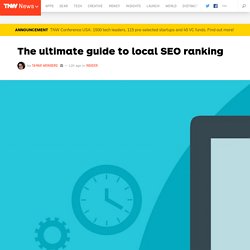
After all, today, everything we do is governed by what we can easily find at our fingertips. If we’re going to a far away destination, we’re likely not opening a paper map; we’re using our phones. If we’re looking for a product at a store, most of us (in this particular demographic, at least!) Are checking whether we can buy it online first before we check the stores.
If you want to be found, you need to be visible. The rise of smartphones has intensified the importance of being visible, especially for local searches. If you’re a local business, you must compete with every other local business in your midst. If my iPad is broken and in need of repair, I might pull up a search from the office that will find me a nearby establishment that can do just that (though it may not be the best one or the cheapest either). Citations For Local SEO. What are citations?
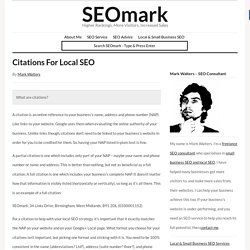
A citation is an online reference to your business’s name, address and phone number (NAP). Like links to your website, Google uses them when evaluating the online authority of your business. Local Landing Pages: A Guide To Great Implementation In Every Situation. Do you keep seeing terms like "city landing pages" and "service area pages" mentioned on Local SEO blogs and find yourself wondering if this form of marketing is a good match for your business?
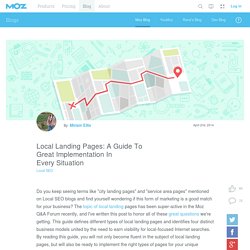
The topic of local landing pages has been super-active in the Moz Q&A Forum recently, and I've written this post to honor all of these great questions we're getting. This guide defines different types of local landing pages and identifies four distinct business models united by the need to earn visibility for local-focused Internet searches. Local SEO Tips & Advice. These local SEO tips are for businesses who want to improve their visibility in local search results, which are those for which Google lists 3 to 7 local businesses and a map above, or blended into, their normal search results.
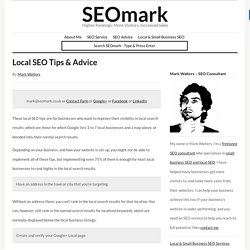
Depending on your business, and how your website is set-up, you might not be able to implement all of these tips, but implementing even 75% of them is enough for most local businesses to rank highly in the local search results. Have an address in the town or city that you’re targeting Without an address there, you can’t rank in the local search results for that location. You can, however, still rank in the normal search results for localised keywords, which are normally displayed below the local business listings. 16 Ways to Create Unique “Local” Content for Cities Where You Want to Rank. Are you creating pages on your site that target specific cities where you want to rank well in the organic search results for local businesses?
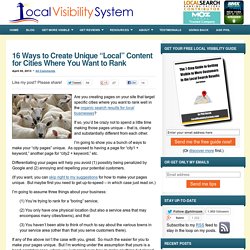
If so, you’d be crazy not to spend a little time making those pages unique – that is, clearly and substantially different from each other. I’m going to show you a bunch of ways to make your “city pages” unique. As opposed to having a page for “city1 + keyword,” another page for “city2 + keyword,” etc. Differentiating your pages will help you avoid (1) possibly being penalized by Google and (2) annoying and repelling your potential customers.
10 Guidelines for Putting NAP Info on Your Site for Local SEO. Peanut (our cat) – the nap expert at work.
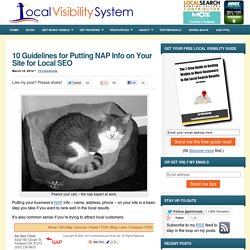
Putting your business’s NAP info – name, address, phone – on your site is a basic step you take if you want to rank well in the local results. It’s also common sense if you’re trying to attract local customers. Still, I get questions all the time – questions about all the details. Local Search Ranking Factors 2014 - Local SEO and How to Rank in Google. Local Pack/Finder Ranking Factors Google My Business Signals (Proximity, categories, keyword in business title, etc.) 25.12%Link Signals (Inbound anchor text, linking domain authority, linking domain quantity, etc.) 16.53%Review Signals (Review quantity, review velocity, review diversity, etc.) 15.44%On-Page Signals (Presence of NAP, keywords in titles, domain authority, etc.) 13.82%Citation Signals (IYP/aggregator NAP consistency, citation volume, etc.) 10.82%Behavioral Signals (Click-through rate, mobile clicks to call, check-ins, etc.) 9.56%Personalization 5.88%Social Signals (Google engagement, Facebook engagement, Twitter engagement, etc.) 2.82% Localized Organic Ranking Factors Introduction Another year, and another Local Search Ranking Factors survey is here.
My apologies for being late with it again. My thoughts and summary of the survey results can be found here on the Moz Blog, and I would love to hear your thoughts and questions in the comments section here. Definitions. Get Your Multi-Location Business Ranking in Multiple Cities With One Domain. In 2010 Matt Cutts threw this little nugget to the oft-neglected Local SEO community; "Make a web page for each store location".
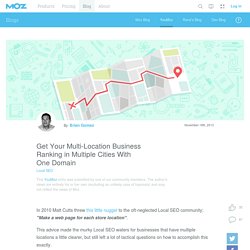
This advice made the murky Local SEO waters for businesses that have multiple locations a little clearer, but still left a lot of tactical questions on how to accomplish this exactly. In this YouMoz post, I'll outline a strategy and some tactics I've used that have allowed me to help multiple clients achieve high rankings in different cities using only one domain name. These tactics have worked for businesses that have multiple locations, whether they are a large chain, multiple franchises or a law firm with offices in 10 cities. Benefits of a Single Domain for Multi-location Businesses [I’m going to use brand.com as an example URL throughout this article but feel free to use your domain of choice in lieu of.]
No Confusing Branding – This is really simple. Measuring Success So, to be clear, here's what we are hoping to achieve using a single domain: Designing Business Location Website Pages, Part 2: Multiple Location Business. This is part two of a three-part series on creating the best business location landing pages for your website.

Local search ranking factors put a strong trust signal on the location information your own website provides and we'll explore how to best create your landing page design, experience and data for single location businesses, multi-location businesses (two dozen) and mass location business that need a location finder or geo-search tool. Multiple Location Business & Web Design This post is aimed at a business that has anywhere from two to maybe a dozen or more physical locations. Designing Business Location Website Pages: Part One – Single Location Business. Website Content & Design Archives. An Introduction to Local Search for Restaurants [Ed. note: The following is a guest article written for Local U by Jackson Lo of Menu.ca.]
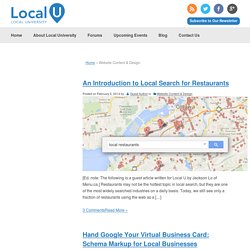
Restaurants may not be the hottest topic in local search, but they are one of the most widely searched industries on a daily basis. Today, we still see only a fraction of restaurants using the web as a […] 30 Common Local SEO Problems & How To Fix Them. Local SEO can become quite complex.
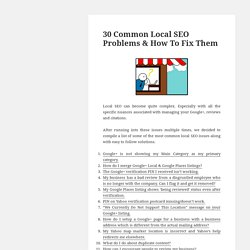
Especially with all the specific nuances associated with managing your Google+, reviews and citations. After running into these issues multiple times, we decided to compile a list of some of the most common local SEO issues along with easy to follow solutions. 1. Google+ is not showing my Main Category as my primary category If you have more than one category selected, Google doesn’t always show them in the order selected (or the order you want).
Solution Steps Delete your categories (except the one you want as the main one) one by one, saving between each delete.When all but your primary category is deleted, make sure that one displays correctly.Now add all the other categories again, but this time at once. Google Places Citations: 5 More Tactics to Earn Links for Your Local Business. The local listings in Google + Bing are becoming more competitive sector by sector and for some local businesses on the web, even tactics like competitive citation analysis and tools like Whitespark's awesome local citation finder aren't enough. Here, then, are five more unique and useful ways to boost the visibility of your local site on the web, earn more Places citations + reviews and potentially appear in even the most competitive local SERPs. #1 - Discussion Search + Local Keywords Google's "discussion search" feature is underutilized in general, but I was surprised when browsing the recommendations of other citation-focused threads to see that it hadn't ever been mentioned!
Watch how easy it is: The discussions not only lead you to sites where listings are often possible, but they also give a great opening to mention or promote your business (just make sure you do it authentically + transparently). Local SEO Landing Pages 2.0.
Local SEO: How To Rank Your Local Business. Local SEO for WordPress. Optimizing Your Website for Local Searches. In his book Ultimate Guide to Optimizing Your Website, SEO and online marketing expert Jon Rognerud shows you how to build a high-performance website and get top ranking on all search engines. In this edited excerpt, the author offers a few tips to help you improve your ranking in local search results. Local search engine optimization (SEO) isn't different from "regular" SEO -- it can be just as time consuming and competitive.
The same rules apply: good content and quality links. However, the tactics are slightly different in some areas. The trends show an increase in local search and from mobile devices. To learn more, start with Google Places For Business by getting a free account and make sure to watch the training videos. While much focus is placed on Google Places, don't forget to also register at:
Top 20 Local Search Ranking Factors: An Illustrated Guide. First published in 2008 by David Mihm, the Local Search Ranking Factors survey of Local SEOs around the globe has become a high point in the year in local search. If you eagerly await this yearly report and comb through it for new insight, then the information in this guide may not come as news to you.
I wrote this guide for marketers who are new to the field of local SEO and for local business owners who are flying solo in their efforts to market their companies on the web. Local Search Ranking Factors 2013 identified 83 foundational ranking factors. Moving to a New Location? Don't Forget about Local Search. It’s obviously not uncommon for small businesses to move -- fluctuating rents, growth, lifestyle concerns for the business owner or employees, and any number of factors make good reasons to move. Local SEO made easy! SEO For Local Businesses. SEO is often discussed with reference to large companies, corporations and businesses competing nationally or even globally.